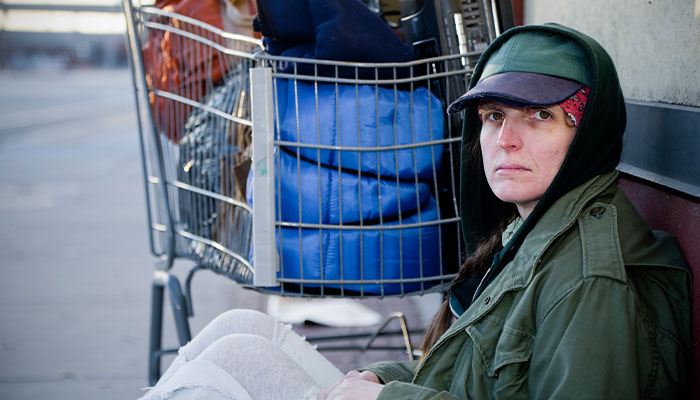People experiencing homelessness might avoid needless and repeated hospital treatments if they received proper preventative care and continuity of care, according to new research that analysed data collected over a 13-year period.
The high cost of nearly $82,000 a person for hospital treatment highlights the pressing need for supported housing, says Professor Olav Nielssen of Macquarie's Faculty of Medicine, Health and Human Sciences.

Rough living: The main characteristics of people in the study who had repeat hospital visits included that they were women who had a mental illness.
Data from 2140 adults who attended homeless hostel clinics in Sydney and were hospitalised showed that the median cost of $81,481 per person for treatment in hospital amounted to a total cost of $548.2 million for 27,466 admissions, an average of about 12 admissions each in the study period.
One in five were readmitted within a month and just over a quarter were deemed 'high users' of hospital services, according to the study by Australian Institute of Health Innovation (AIHI) researchers published in the Australia and New Zealand Journal of Public Health. The study linked clinic, healthcare use and mortality data from 1 July 2008 to 30 June 2021.
"The cost of these hospital admissions is staggering for such a small group of people," says Professor Olav Nielssen of Macquarie's Faculty of Medicine, Health and Human Sciences, who co-authored the paper with Professor Rebecca Mitchell.
If the Australian Government spent even a fraction of the amount of money it's spending on hospital admissions to provide supported housing it would make a massive difference.
"These people need better continuity of care and better preventive care, and the best way to do this, which has been proved globally, is through housing integrated with support services that include preventive care for physical and psychiatric disorders. Our research provides a business case for the government to do that."
Nielssen, who provides walk-up psychiatric care at the Matthew Talbot Hostel Clinic run by the St Vincent de Paul Society, where most of the data was collected, points to supported housing models in Canada, Italy, and Finland and a successful project in Victoria, for people experiencing homelessness.
Finland is the only country in Europe that has reduced its homeless population, with the help of projects such as the Y Foundation which provides long-term housing integrated with ongoing support services and care.
"If the Australian Government spent even a fraction of the amount of money it's spending on hospital admissions to provide supported housing it would make a massive difference," says Nielssen.
"It's very difficult to provide continuity of care when people sleep rough or have no address, to get them to fill their prescriptions, take their medication, keep their meds safe, and attend follow-up appointments."
Life expectancy drops 20 years
Nielssen's co-author, Associate Professor Rebecca Mitchell of AIHI, says the fact that people are readmitted frequently points to a "stark need" to improve preventive healthcare measures.

Reaching out: Providing better support for people experiencing homelessness will help alleviate the burden on the health system, the researchers say.
"The flip side is that we want to ensure that when people are being admitted, they also have complete, quality care in hospital and are not prematurely discharged," says Mitchell.
International research shows that people living in supported housing projects reduced their number of emergency department visits and hospital admissions. This was because their health improved with better living conditions, stable housing, and financial and social support.
"Supported housing can provide these steps towards preventive healthcare," says Nielssen.
Half of the hospital admissions and readmissions in the study were for people with mental and behavioural disorders, while 82 per cent of people had a substance abuse history. The main characteristics of people in the study who had repeat hospital visits were: they were women who had a mental illness or substance abuse disorder; were aged over 45, and were homeless for more than a year.
The study also shows a high mortality rate of participants; 15 per cent of the cohort died over the 13-year period. "Experiencing homelessess means their life expectancy is reduced by about 20 years compared to the general population," says Mitchell.
According to the Australian Institute of Health and Welfare, the Commonwealth spends an average of $7926 per person on healthcare per year and an average cost of $4971 per person for hospital admissions – much lower than the figure for people experiencing homelessness.

By publishing this research, Mitchell says AIHI is providing more evidence for the community health organisations lobbying the government for increased funding and for those advocating for fundamental structural and policy change.
"Providing better support for people experiencing homelessness through on-the-ground services such as community-based support services will help alleviate the burden on the health system and improve outcomes for these vulnerable people," she says.
Olav Nielssen is a Professor of Psychiatry at Macquarie's Faculty of Medicine, Health and Human Sciences.
Rebecca Mitchell is a Assoc Professor at the Australian Institute of Health Innovation, Centre for Healthcare Resilience and Implementation Science.






